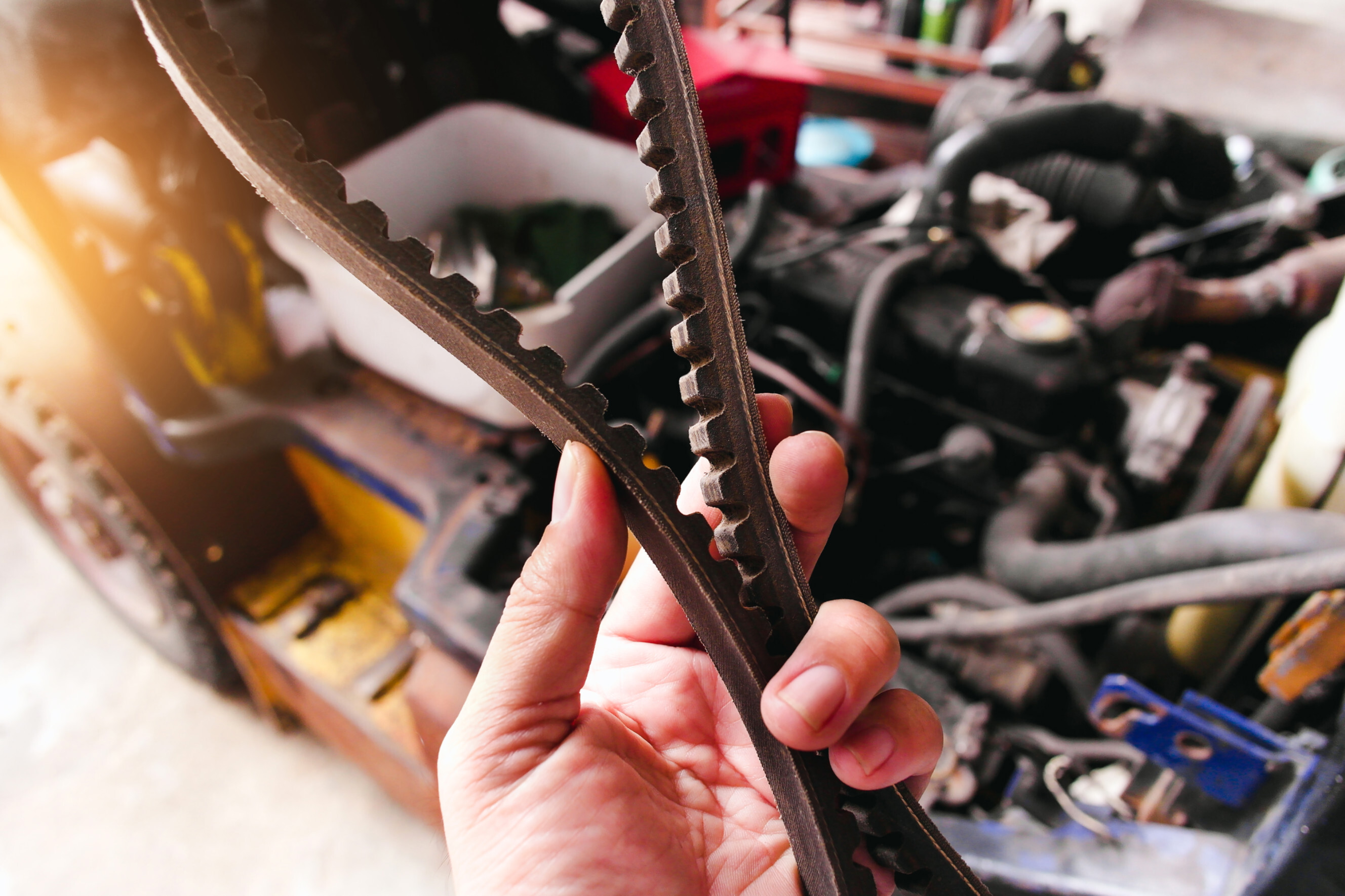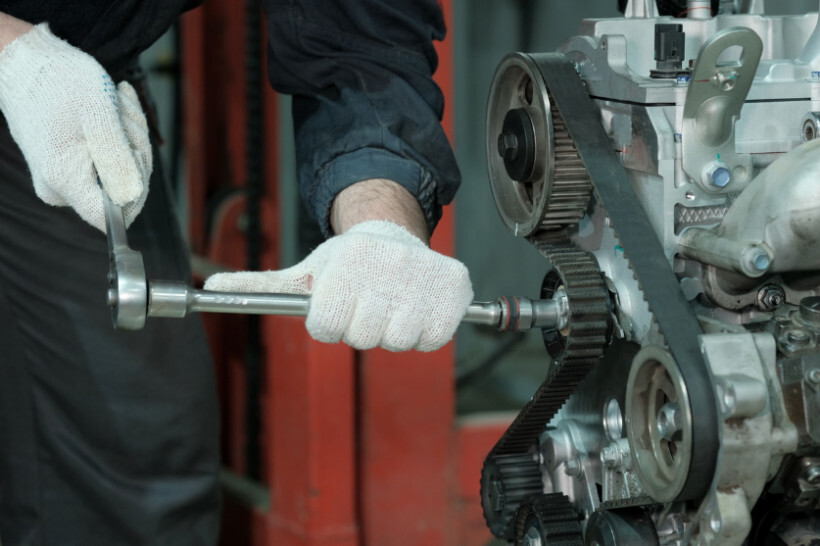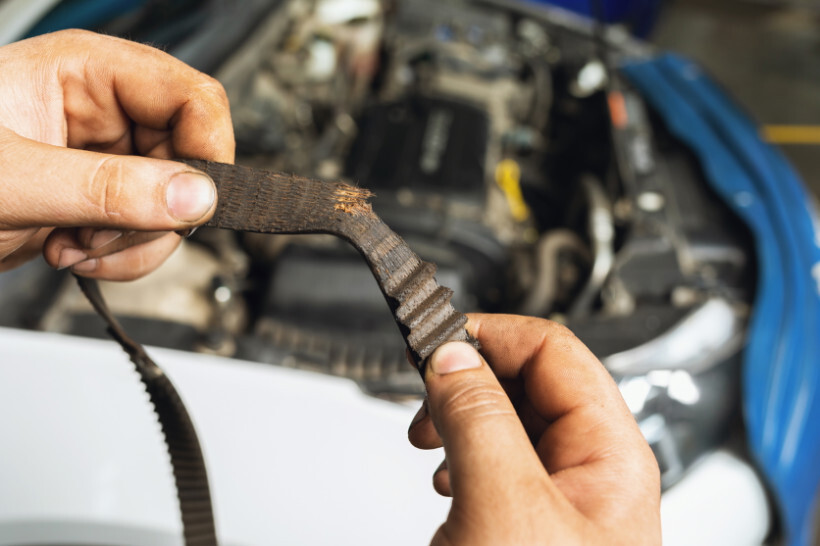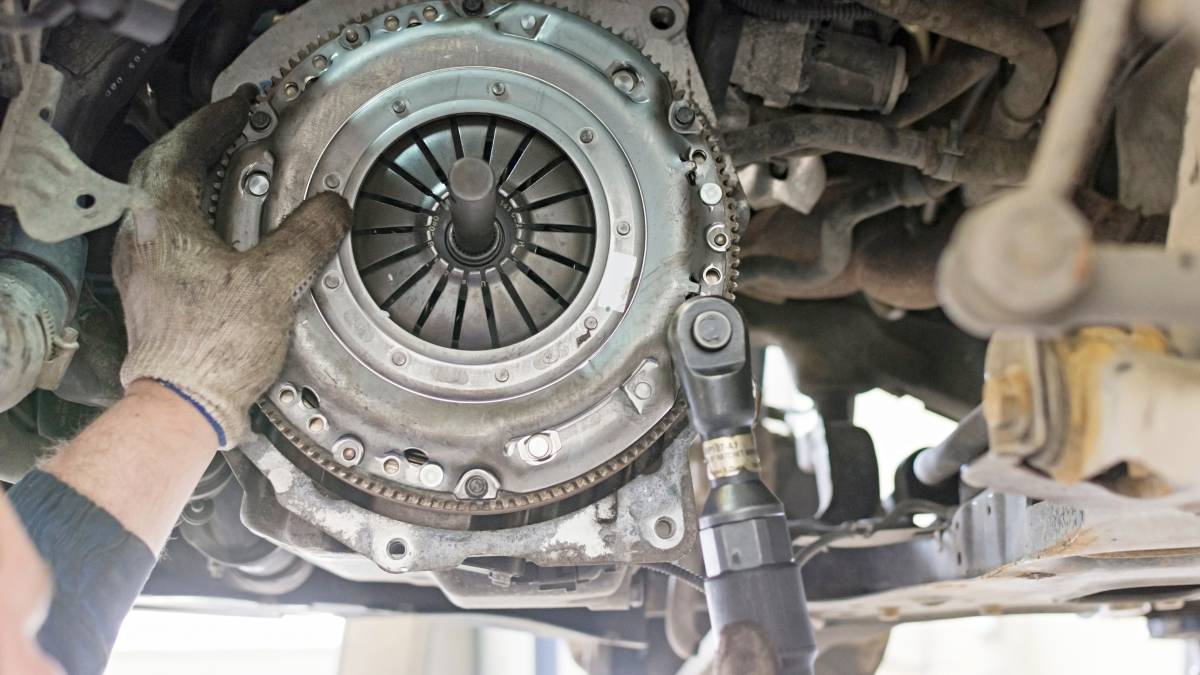- Home/
- Costs/
- Timing Belt Replacement/
- Timing Belt Replacement Cost Guide

How much does timing belt replacement cost in the UK?
Get a free quote nowPost to find a price. It's free and only takes a minute.
Average price (part + labour)
£350 - £700
low
£350
median
£525
high
£700
Last Updated on

Written by Angela A.
Staff Writer
Read more about our contributor
Key Facts
Timing belt replacement prices in the UK vary widely, with costs ranging from £350 to £700.
Labour costs in urban areas like London are significantly higher than in rural regions, often adding £200 or more to the bill.
Certified mechanics with expertise in your car model are crucial for ensuring accurate installation and preventing engine damage.
Did you know that a broken timing belt can lead to severe engine damage, potentially costing thousands of pounds to repair? That’s why changing your timing belt as soon as needed is important. If you’re in this predicament, the first step you need to take is to figure out the usual timing belt replacement cost in the UK.
You can expect to pay anywhere from £350 to £700 to replace your timing belt, depending on variables like your car model. This guide will break down the key factors affecting the cost of cambelt replacement further so you can plan for this critical maintenance task.
Are timing belts, timing chains, and cambelt the same?
 A coiled timing belt with engine components around it. (Source: iStock)
A coiled timing belt with engine components around it. (Source: iStock)
In the UK, the timing belt and cambelt refer to the same engine component. “Cambelt” is the term commonly used locally, while "timing belt" is the global equivalent. This part is made of rubber reinforced with fibres designed to synchronise the rotation of your engine’s crankshaft and camshaft. This ensures the engine opens and closes at the precise moments needed for efficient combustion.
Timing chains, despite having the same purpose, are made of completely different materials. They’re built out of metal and tend to last longer—often exceeding 100,000 miles with proper maintenance. But since they’re noisier and heavier, they’re still less common in modern car engines.
What are the average costs of timing belt replacement in the UK?
|
State/City/Area |
Average cost of timing belt replacements |
|---|---|
£500 to £650 |
|
Manchester |
£470 to £560 |
Birmingham |
£500 to £600 |
Yorkshire |
£400 to £600 |
Glasgow |
£500 to £580 |
South Hampshire |
£400 to £700 |
Liverpool |
£500 to £580 |
Newcastle |
£540 to £620 |
Nottingham |
£350 to £450 |
The average price for timing belt replacement in the UK ranges from £350 to £700, depending on factors like your car’s make and model, the complexity of the job, and local labour rates. For smaller cars, you can expect costs closer to £350, as the belt is easier to access. On the other hand, premium vehicles often push the cost to £700 or more due to intricate disassembly and higher expertise required.
The location also impacts pricing. In major cities, rates hover around £500 to £650, while less populated areas offer more affordable options, starting at £350. In any case, labour makes up a significant part of the expense. But although cutting corners with cheaper materials may save you money initially, it’s important to note that this could lead to faster wear or even engine damage.
What factors affect the costs of timing belt replacement?
As we mentioned a while back, the cost of timing belt replacement can vary widely due to several factors, from the make and model of your car to labour rates in your area. Let’s break these down in detail below.
Vehicle make and model
| Vehicle make and model |
Average cost of timing belt replacements |
|---|---|
Ford Fiesta |
£310 to £510 |
Peugeot 308 |
£360 to £560 |
Volvo V40 |
£470 to £720 |
VW Golf |
£450 to £680 |
Audi A1 |
£500 to £850 |
Mini Cooper |
£480 to £750 |
Ford Focus |
£330 to £550 |
Understanding your car’s requirements is key to planning for timing belt replacement. After all, your car’s make and model greatly impact the overall cost.
For instance, Audi timing belt replacement cost in the UK typically ranges from £500 to £850, as premium vehicles require specific parts and skilled labour. In fact, replacing the timing belt for other models with complex engines like the VW Golf can reach £450 to £680.
In contrast, the cost for a Ford Fiesta and Ford Focus timing belt replacement costs are lower, between £310 and £510 and £330 to £550, respectively, due to their simpler engine design and affordable components.
For mid-range cars, Peugeot timing belt replacement cost between £360 and £560. Meanwhile, Mini Cooper timing belt replacement costs £480 to £750 and the same service for a Volvo V40 will have you shelling out £470 to £720.
Geographic location
 Mechanic working on a car engine. (Source: iStock)
Mechanic working on a car engine. (Source: iStock)
Where you live in the UK significantly affects the cost to replace a timing belt. In London, prices are among the highest, ranging from £500 to £650, because of the high cost of living and greater demand for skilled mechanics in the area. In Birmingham, costs fall between £500 and £600, due to its similar urban nature and competitive rates.
Other cities, such as Manchester and Liverpool, offer slightly lower prices—averaging £470 to £560 and £500 to £580, respectively. But rural areas like South Hampshire and Yorkshire see wider pricing, with costs ranging from £400 to £700 and £400 to £600, depending on service availability.
Out of all the areas, Nottingham offers the most affordable rates. You can get your timing belt replaced there with roughly £350 to £450, so it’s ideal for those seeking budget-friendly options.
Complexity of the job
 Mechanic replacing a timing belt. (Source: iStock)
Mechanic replacing a timing belt. (Source: iStock)
The complexity of the job, especially for vehicles with intricate engine designs, also bumps up the pricing. Cars requiring extensive disassembly result in higher labour fees due to the time and skill involved.
Additionally, while timing belt checks aren’t included in the MOT test checks, adding this service during your inspection typically costs an extra £45 to £95, depending on the garage. Expect costs to rise even further for vehicles requiring additional diagnostics or component replacements.
Price of parts and labour
| Additional parts needed |
Average costs |
|---|---|
Timing chain |
£600 to £1,200 |
Drive belt |
£150 to £300 |
£120 to £200 |
|
Water pump |
£200 to £500 |
Tensioner |
£50 to £150 |
Parts and labour are the two major drivers of how much it costs to replace a timing belt. A standard replacement ranges from £310 to £850, but any additional repairs needed will add a few pounds to the total price.
For starters, some garages also recommend replacing related components at the same time, like the water pump (£200 to £500) or tensioner (£50 to £150), to ensure long-term performance.
For more extensive repairs, you might also be advised to replace your existing timing belt with a timing chain, which can cost £600 to £1,200 to install. Simpler parts, such as a drive belt (£150 to £300) or fan belt (£120 to £200), might also need replacing if they’re worn or damaged.
Emergency service fees
|
Diagnostic and emergency services |
Average service fees |
|---|---|
£100 to £200 |
|
£50 to £150 |
|
Emergency repairs |
£150 to £350 |
Emergencies often mean higher costs, too, especially when you end up needing a mobile mechanic or same-day repairs, so don’t be too surprised to see a hefty bill when finding out how much it costs to get your timing belt replaced if it’s an emergency service.
Mechanic call-out fees typically range from £100 to £200, depending on the urgency and location. Adding a diagnostic test to assess timing belt issues costs another £50 to £150, helping pinpoint the exact problem before repairs.
For immediate fixes, a timing belt change’s price combined with diagnostics and labour can climb to £150 to £350, especially if parts need to be sourced quickly. Regular garages may offer more affordable options but know that emergencies often mean paying higher for convenience and speed.
What are the warning signs to watch out for before a timing belt breaks?
 Close-up view of a worn timing belt. (Source: iStock)
Close-up view of a worn timing belt. (Source: iStock)
Driving conditions, weather, and even your habits behind the wheel can accelerate timing belt wear. Ignoring the signs could lead to significant engine damage and expensive repairs down the road. Here’s how to spot the warning signs early:
Unusual noises: Ticking or clicking sounds from the engine might indicate a worn or loose belt. Squealing or grinding noises suggest alignment or tension issues.
Engine performance issues: Misfires, sluggish acceleration, or trouble starting the car could mean the belt isn’t keeping the engine synchronised.
Visible damage: Cracks, fraying, or missing teeth on the timing belt are clear indicators that it needs replacement.
Rough idling or vibrations: Poor belt tension can make the engine shake or idle roughly.
Burning rubber smell: Overheating from friction could mean the belt is slipping.
While these symptoms often point to a failing timing belt, they could also signal other issues. Visit a mechanic for a diagnostic test to confirm the problem and avoid more extensive damage.
What are some ways to save on timing belt replacement?
 Mechanic holding a new timing belt. (Source: iStock)
Mechanic holding a new timing belt. (Source: iStock)
Car maintenance is essential, but it doesn’t have to break the bank. Aside from wondering about how much it’ll cost to replace the timing belt, think of how you can save while ensuring quality work. Here are some practical tips to help you:
Replace related components like the water pump and tensioners at the same time to save on labour costs. Bundled replacements typically cost less compared to separate services.
Local garages charge less than dealerships, so opt for mechanics in your area.
Always request quotes from at least three mechanics to find the best deal.
Look for online promotions, loyalty discounts, or special offers at garages or chain service centres.
High-quality aftermarket timing belts offer savings over original equipment manufacturer (OEM) parts.
Frequent checks during routine servicing can catch wear early, so don’t skimp on regular inspections.
What should you look for in a professional mechanic?
 Mechanic repairing a car engine in a garage. (Source: iStock)
Mechanic repairing a car engine in a garage. (Source: iStock)
Choosing the right mechanic is critical not just to ensure quality work is done on your car but to also avoid unnecessary costs. Here’s what to consider when evaluating your options:
Look for certifications and credentials. Choose mechanics certified by recognised bodies like the Institute of the Motor Industry (IMI) or have an Automotive Technician Accreditation (ATA).
Ensure experience with specific models. Make sure the mechanic has experience with your car make and model. This is especially important for vehicles with custom designs, where replacing the timing belt’s price can be wildly different.
Read reviews and testimonials. Look for consistent positive feedback, particularly about timing belt replacements.
Ask for a detailed quote. Request itemised quotes, including costs for parts, labour, and any related services. Knowing exactly what’s included can prevent hidden charges.
Go local. Trusted local mechanics often provide personalised service and competitive pricing compared to larger chains.
Get your cambelt replaced by skilled professionals on Airtasker
A broken timing belt can wreak havoc on your engine, leaving you with sky-high repair costs. That’s why it’s crucial to address any warning signs and schedule a replacement promptly.
Finding a trustworthy mechanic for a timing belt replacement or a cambelt change doesn’t have to be a hassle. Just post your task on Airtasker and connect with experienced professionals who know their way around your car’s engine.
From certified mechanics to local garages, Airtasker makes it easy to compare quotes, check reviews, and book the right specialist for the job. Don’t wait until it’s too late.
Learn more about our contributors

Written by Angela A.
Staff Writer
Angela Apolonio is an experienced writer with a Biology background. She writes about home tips, car upkeep, gardening hacks, and food facts, bringing a unique blend of science and practicality to her work. As a wife and a mother, she knows the value of iron-clad routines, so she's passionate about sharing what works for her with everyone else. She loves making everyday life simpler and helping readers find fresh ideas to bring more joy into their spaces.
FAQs on timing belt replacement costs
The cost ranges from £350 to £700, depending on your car’s make, model, location, and mechanic rates. For luxury cars like BMWs or Land Rovers, costs can reach up to £1,400.
In London, replacement typically costs £500 to £650, higher than the national average due to increased labour rates and demand. Urban garages have higher operating costs compared to those in smaller towns.
Yes, it’s a complex task requiring the disassembly of engine components and precise realignment of the camshaft and crankshaft. Depending on the vehicle's design, it can take anywhere from 2 to 12 hours.
Absolutely. Replacing a timing belt prevents catastrophic engine damage that could cost thousands of pounds to repair. Regular replacement also ensures reliability and avoids sudden breakdowns.
Replacing a timing belt is labour-intensive, requiring 2 to 6 hours of precise engine work. Additional costs come from replacing related components like drive belts and fan belts to prevent future repairs.
Timing belts last between 40,000 and 155,000 kilometres—or 5 to 10 years—depending on the car’s make and driving conditions. Regular maintenance and inspections can extend this lifespan, while delays risk catastrophic engine damage, which can cost up to $5,500.
Find timing belt replacement specialists, fast
Post a task
Related price guides
Related articles








